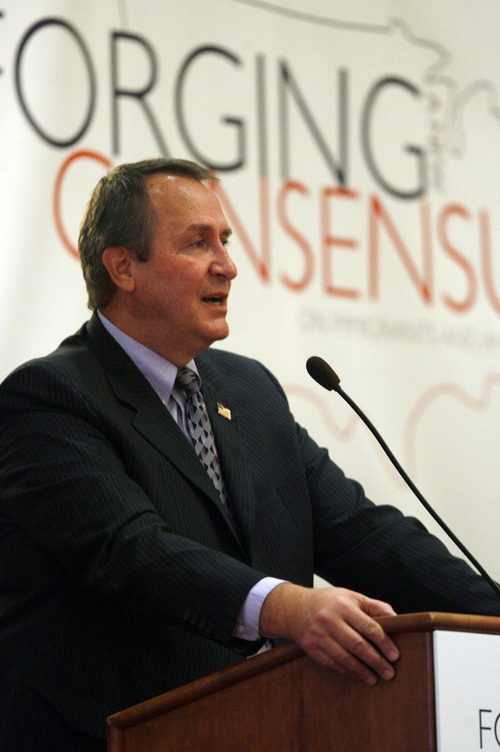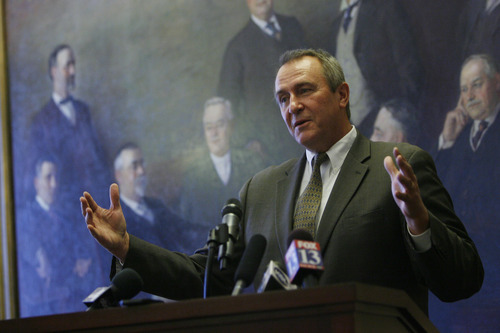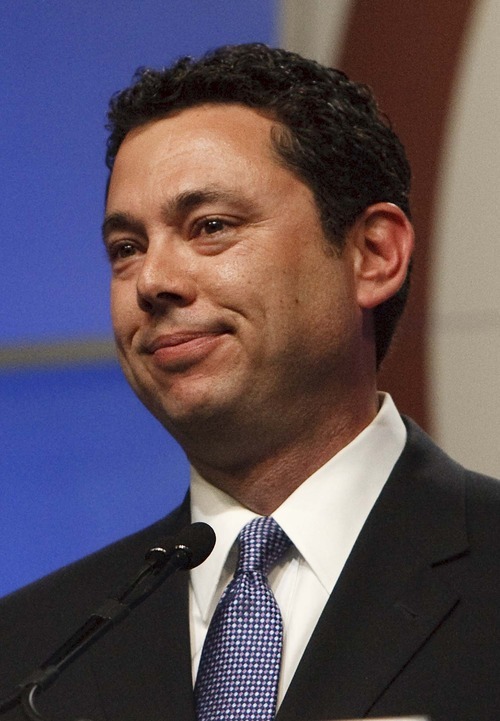This is an archived article that was published on sltrib.com in 2012, and information in the article may be outdated. It is provided only for personal research purposes and may not be reprinted.
Utah Attorney General Mark Shurtleff looks at the immigration plank of the national Republican Party's platform and sees the Latino vote evaporating before his eyes.
"We all know how important the Latino vote is," Shurtleff said Friday. "This kind of thing does so much harm to the party."
As a delegate at the Republican National Convention, which kicks off Monday, one of his charges will be to vote on the platform. The platform already passed through the designated committee, and the immigration language is seen as tough — thanks in large part to Kris Kobach, a leader in immigration restrictionist circles.
There isn't much chance the language will be changed and probably will be adopted in its entirety. Shurtleff said party loyalists would be reluctant to re-open the debate and have a platform fight.
But he remains worried about the tone it sets and the connection between presumptive GOP nominee Mitt Romney and Kobach, who is an adviser to the presidential campaign.
"He shouldn't be kept around," Shurtleff said. "They need to distance themselves from him."
Kobach on Tuesday managed to get the platform committee to adopt language that calls for a border fence, a national E-Verify program, ending federal funding to cities that aren't perceived to be tough enough on illegal immigration and, most troubling to Shurtleff, an end to in-state tuition for illegal immigrants.
"That one is just obnoxious," Shurtleff said.
Kobach, Kansas secretary of state, did not return calls Thursday and Friday for comment.
Rep. Jason Chaffetz, R-Utah, said he supports the platform and thinks there should be a double-fence along the border. He also said he's not worried about the platform doing damage to the image of the Romney campaign among Latino voters.
"You have to fight for what you believe in, even if it costs you a few extra votes," Chaffetz, also a convention delegate, said. "It's based on principles."
It could cost Romney more than just a few extra votes, though.
In an NBC/Wall Street Journal/Telemundo poll released earlier this week, President Barack Obama leads Romney 63 percent to 28 percent among Latino registered voters. In the same poll, Obama was viewed positively by 67 percent of Hispanics while only 31 percent of Hispanics saw Romney in a positive light.
And 33 percent of Latinos viewed the Republican Party positively compared to 57 percent seeing the Democrats in a favorable light.
Those numbers are far from the stated goal of getting 38 percent of the Hispanic vote, Jose Fuentes, a national co-chairman of Romney's Hispanic leadership team, told The Hill newspaper.
Bruce Merrill, a professor emeritus and pollster at Arizona State University, said the combination of the party platform, Kobach and strong support for enforcement-only legislation is pushing generations of Latinos away from the GOP.
"Once you have those perceived attitudes, they are difficult to change," Merrill said. "It's a branding issue — not just with minorities — but in general. The tea party has basically driven the platform and political positions and rhetoric to such an extreme that I don't think they can change it this year."
Sean Reyes, a Utah Republican delegate and former attorney general candidate, said the party has suffered from an image problem related to hard-line stances on immigration — noting the dwindling percentage of Latino support for GOP presidential candidates since George W. Bush's high-water mark of 44 percent nationally.
But he said if the conversation would move past immigration, Latinos would see the Republican Party has a lot to offer.
"It's a disservice every time Latinos are mentioned, it comes back to immigration, when we can talk to them about concerns as small business owners or in education."
One area of the platform that was new was language added by Bruce Bailey, a Texas business entrepreneur, that sought to include a guest-worker angle.
It wasn't a full endorsement but instead directed the party to "consider, in light of both current needs and historic practice, the utility of a legal and reliable source of foreign labor through a new guest-worker program."
Shurtleff said the party needs to move more toward Bailey and away from Kobach — especially if Romney is to capture the White House in November.
"We have a big tent. There's room for those guys — but you don't want them part of Romeny's team," he said. "The action challenging childhood arrivals or the plank put in denying in-state tuition I think hurts us. It hurts Mitt Romney, and I want Mitt to win."
dmontero@sltrib.comTwitter; @davemontero







